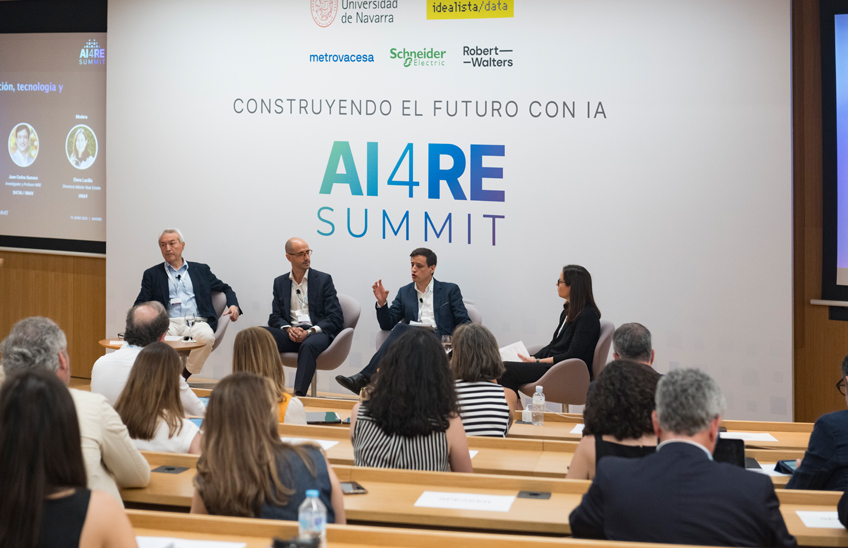81% of the real estate sector will invest in artificial intelligence by 2025
The University brought together real estate leaders, academics and artificial intelligence specialists to address the technological and training challenges of the industry

FotoCedida/Throughround tables of experts, the challenges of the sector were addressed, from design and investment to the operation of intelligent buildings.
17 | 06 | 2025
The University of Navarra brought together more than 150 real estate experts, academics and artificial intelligence specialists at the AI4RE Summit, one of the first congresses in Spain focused on AI and Real Estate, to address the technological and training challenges of the sector, from design and investment to the operation of intelligent buildings.
"AI advances will decisively influence all segments of business, from asset valuation, people management or the industrialization of construction," explained Carlos Naya, director of the School of Architecture at the University of Navarra. The meeting, held at the postgraduate headquarters of the University of Navarra in Madrid, was supported by the School of Architecture and DATAI (Data Science and Artificial Intelligence Institute of the University of Navarra).
Leading companies such as Idealista Data, Metrovacesa, Schneider Electric and Robert Walters supported this initiative focused on the transformation of the sector through artificial intelligence. Firms such as Grupo GMP, Fifth Wall, Azora, IESE Business School and AMETIC also took part and discussed the new management paradigm based on data.
According to the Deloitte study 2025 commercial real estate outlookmentioned at the event, "81% of global real estate professionals expect to increase investment in generativeartificial intelligence and data by 2025".
AI, sustainability and employability: three strategic axes
One of the themes highlighted at the event was the ability of AI to accelerate the sector's green transition. With 80% of today's buildings still operational in 2050, energy efficiency and decarbonization of the building stock become priorities. Artificial intelligence makes it possible to detect inefficiencies, anticipate consumption patterns and design buildings that optimize their behavior in real time.
Enrique Serrano, president of AMETIC's AI and Big Data Commission, highlighted the need to generate shared intelligence in the sector to manage data and for the sector to benefit from advances. To this end, he encouraged the leaders of each segment to drive the market.
In addition, it was noted that 60% of jobs in advanced economies are exposed to the impact of AI. In this context, specialized training becomes an essential competitive factor. Hence the relevance of programs such as the Master's Degree in Real Estate Strategy and Business (Master in Real Estate) promoted by the School of Architecture of the University of Navarra.
Training, technology and leadership from the university
As part of the congress, the round table Future from the University of Navarra: training, technology and leadership, moderated by Elena Lacilla, director of the Master in Real Estate Strategy and Business, was held with the participation of Juan Carlos Gamero, postdoctoral researcher at DATAI; Alejandro Aguirre de Cárcer, CEO of Brains Real Estate; and José Luis Suárez, professor emeritus at IESE Business School.
The debate addressed the impact of generative AI, new professional profiles and the urgency of adapting academic programs to an environment dominated by predictive analytics and big data. "The most relevant thing is to show, from different approaches, the fundamental role that the university has in the new way of working that artificial intelligence poses and its impact on Real Estate", highlighted Lacilla. For his part, Juan Carlos Gamero said that "data is no longer just something that is consulted: today it is a strategic asset that allows processes to be automated, demand to be forecast or real estate to be valued automatically".
Experts agreed that artificial intelligence represents both a challenge and a strategic opportunity for Real Estate. According to a McKinsey & Company report cited during the congress, the widespread adoption of AI could generate up to "$180 billion in added value for the sector over the next decade."
With the celebration of the AI4RE Summit and the formative impulse of the Master in Real Estate Strategy and Business, the University of Navarra reinforces its role as a platform for knowledge, innovation and connection between university, business and society at a time of radical transformation of the urban environment.
